
Helen Beulah Thompson Gaige was an American herpetologist, curator of Reptiles and Amphibians for the Museum of Zoology at the University of Michigan, and a specialist in neotropical frogs.

Sachatamia ilex is a species of frog in the family Centrolenidae. It is found in eastern Nicaragua, Costa Rica, Panama, western Colombia, and western Ecuador. Common name Limon giant glass frog has been coined for this species, apparently in reference to its type locality in the canton of Limón, Costa Rica, and it is also known as the ghost glass frog.

Cochranella euknemos, sometimes known as the San Jose Cochran frog, is a species of frog in the family Centrolenidae. It is found in central Costa Rica and south/eastward to Panama and to the western flank of the Cordillera Occidental in Colombia. Some Colombian records might apply to Cochranella mache.
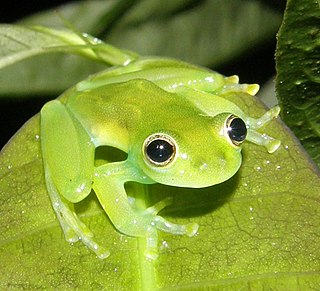
Teratohyla spinosa is a species of frog in the family Centrolenidae. It is found in the Pacific lowlands of northern and central Ecuador and western Colombia, northward on the Pacific slopes Panama and Costa Rica, as well as on the Caribbean slopes of Costa Rica, Nicaragua, and Honduras.
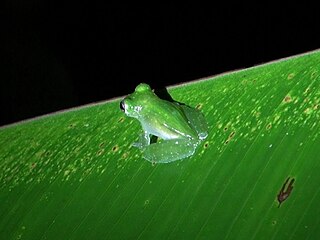
Hyalinobatrachium valerioi, sometimes known as the La Palma glass frog, is a species of frog in the family Centrolenidae. It is found in central Costa Rica and south to Panama and the Pacific lowlands and slopes of western Colombia and Ecuador; also in the Magdalena River Valley of Colombia.
Silverstoneia nubicola is a species of frog in the family Dendrobatidae. It is found in western Colombia, Panama, and southwestern Costa Rica.

Agalychnis saltator, also known as the parachuting red-eyed leaf frog and misfit leaf frog, is a species of frog in the subfamily Phyllomedusinae. It is found in the Caribbean lowlands from north-eastern Honduras to eastern-central Costa Rica at elevations of 15–1,300 m (49–4,265 ft) asl.
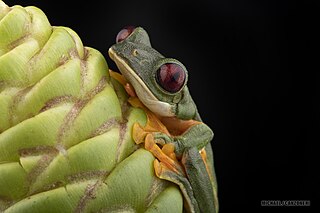
The gliding tree frog is a species of frog in the subfamily Phyllomedusinae. It is found in Colombia, Costa Rica, Ecuador, and Panama. Other common names are the gliding leaf frog, Spurrell's leaf frog, and pink-sided tree frog. The specific name, spurrelli, is in honour of British zoologist Herbert George Flaxman Spurrell.

Strabomantis bufoniformis is a species of frog in the family Strabomantidae. It is found in western Colombia, Panama, and south-eastern Costa Rica. It is sometimes known as the rusty robber frog.

Craugastor mimus is a species of frog in the family Craugastoridae. It is found in lowland and premontane forests on the Atlantic versant from eastern Honduras through eastern Nicaragua to central Costa Rica. Its natural habitat is lowland and premontane moist and wet forests. It is threatened by habitat loss.
Craugastor persimilis is a species of frog in the family Craugastoridae. It is found in the lowlands and premontane Atlantic slopes of central to southeastern Costa Rica. Its natural habitats are lowland and premontane moist rainforest. It lives in leaf-litter and can persist in moderately disturbed areas, including plantations. It is an adaptable species that is not considered threatened, despite severe habitat fragmentation within its range.

Craugastor taurus is a species of frog in the family Craugastoridae. It is found in the Golfo Dulce region of southern Costa Rica and adjacent western Panama. It is sometimes known as the Golfito robber frog.
Pristimantis altae, also known as mountain robber frog, is a species of rain frog in the family Strabomantidae with a bright coral-coloured groin. It is found in Costa Rica and Panama.
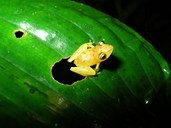
Pristimantis caryophyllaceus is a species of frog in the family Strabomantidae. It is found in Costa Rica and Panama; records from Colombia prior to 2010 refer to Pristimantis educatoris. However, taxonomy of Pristimantis caryophyllaceus and P. educatoris remain unsettled, and many sources continue to report Pristimantis caryophyllaceus from Colombia.

Pristimantis cruentus is a species of frog in the family Strabomantidae, sometimes known as the Chiriqui robber frog. It is found in Costa Rica, Panama, and north-western Colombia. Its natural habitats are forests, including humid lowland and montane forests. It can also be found in degraded habitats outside forests. It is threatened by habitat loss.
Pristimantis moro, also known as La Hondura robber frog, is a species of frog in the family Strabomantidae. It is found in lowland western Colombia, the Pacific versant of Panama, and the Atlantic versant of Costa Rica.
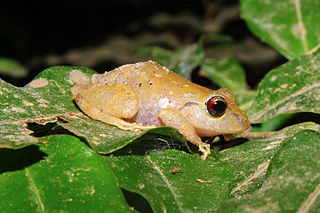
Pristimantis ridens, also known as the pygmy rain frog and the Rio San Juan robber frog, is a species of frog in the family Strabomantidae. It is found in western Colombia, and then through Panama and Costa Rica to Nicaragua and eastern Honduras.
Pristimantis rosadoi is a species of frog in the family Strabomantidae. It is found in north-western Ecuador in Carchi, Esmeraldas, and Pichincha provinces, and in the adjacent Colombia in the Nariño Department as well as on the Gorgona Island; there is some doubt about the identity of the Gorgona Island specimens, while the checklist of Colombian amphibians only mentions the Gorgona record. The specific name rosadoi honors José P. O. Rosado, herpetologist at the Museum of Comparative Zoology, and also alludes to similarity of this species to Pristimantis roseus. Common name Rosado's robber frog has been proposed for it.

The Peralta frog, or montane leopard frog, Lithobates taylori, is a species of frog in the family Ranidae found in Costa Rica and Nicaragua.
Pristimantis educatoris is a species of frog in the family Strabomantidae. It is found in Costa Rica, Panama, and Colombia and is similar to—and prior to its description in 2010—confused with Pristimantis caryophyllaceus. The species was first found in 2002 while researchers were working on a way to save Panama's frogs from extinction from the deadly amphibian disease chytridiomycosis. The species was discovered in Omar Torrijos National Park in Coclé Province, Panama.















